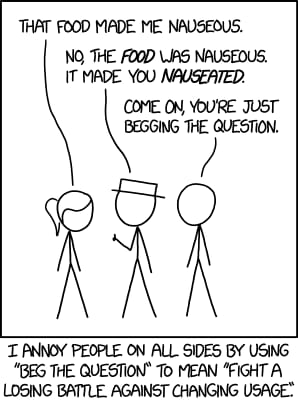The Original Meaning of ‘Begging the Question’

You probably hear the phrase, "that begs the question…" a few times a week. Speakers and writers using these words mean to say—in a sophisticated way—that the point just made raises a new question.
I’ve mostly outgrown my Well Actually habit, but in this case the situation is interesting enough to make an exception.
Notice I say originally, not actually.
Begging the Question is originally a type of flawed argument called a logical fallacy. It’s an informal logical fallacy because it’s not violating deduction, which would do something like:
All men are humans –> Ken is a man –> Therefore Ken is tall.
That’s a formal logical fallacy, and the other ones you’ve likely heard of like Strawman and Appeal to Authority are of the informal variety.
Logical fallacies are the technical fouls of debate.
Aristotle is the first philosopher to formally describe Begging the Question.
Anyway, the original meaning of Begging the Question is a type of circular reasoning where you make a statement that you then justify with another version of the same statement. For example:
Fruits and vegetables are part of a healthy diet. After all, a healthy eating plan includes fruits and vegetables.
So you say the first thing forcefully—which is what you’re trying to argue—and then you give a supporting "argument" that says the same thing in a way that sounds convincing.
You can’t prove an argument by restating it in a different way.
In this case, "A healthy eating plan includes fruits and vegetables" is so well accepted that it’s likely to sound like solid evidence of the first statement. But it’s not because it’s just another way of saying the same thing.
The greatest thing we can do is to love each other. Love is the highest form of human emotion.
Again, this sounds solid because they’re both repeated so often and accepted by so many. The problem is thinking that the second statement supports the first when it does not.
The language of "Begging" and "The Question" comes from the original Greek that was then translated into Latin, which meant, "Asking for the original thing.", where the initial thing is the thing you’re trying to prove. In the examples above, the initial things were "The greatest things we can do is love each other", and, "Fruits and vegetables are part of a healthy diet."
So Begging in that context meant Assuming, and The Question meant the point that they were trying to make. In other words, giving support that Assumes the Conclusion.
Meanings change over time, and that’s ok
We won’t know until later if the meaning has fully changed.
Unfortunately for the pedants—I’m a recovering one myself—words and phrases change meaning all the time. In fact, they’re changing right now, and "Begging the Question" maybe one example.
So maybe it’s actually ok to use Begging the Question as a smart synonym for "raising a question" already. I don’t know when exactly that call is made, and I’m not sure anyone does.
Don’t make the situation worse by calling out the offender in public.
But if someone is attempting to sound smart by using "Begs the Question"—which is invariably the case—it’s probably best for them to know both meanings. And I’ve never seen a situation in which someone who knew both meanings continued to use the new meaning. They usually switch to "raising" instead of "begging". I’m one of those people.
Other examples
Student: Why didn’t I receive full credit on my essay? Teacher: Because your paper did not meet the requirements for full credit.
They added "requirements" in here to make it sound official, but they really just repeated themselves.
Killing people is wrong, so the death penalty is wrong.
That sounds super clean, but all the work is still left undone. Why is killing criminals wrong?
Opium induces sleep because it has a soporific quality.
Cool, so it induces sleep because it makes people sleepy? Thanks for that. This is a light show using five-dollar words.
Summary
This is why it’s called Circular Reasoning—because you’re giving support by restating your premise.
Begging the Question originally meant "Assuming the Conclusion", or—more specifically—giving a supporting statement that assumes your original point is true.
"Begs the Question" sounds cool, so people started repeating it thinking that "Begging" was a smart way to say "Raising".
This has been happening for some time now, so at some point this may become an accepted and official alternate meaning, but I’m not sure if it is yet.
If you know both meanings—which you now do—I recommend you use "Raising" instead of "Begging" unless you really mean Assuming the Conclusion.
Try your best not to be the guy—yes, it’s usually a guy—who calls someone out in a live conversation when they make the mistake. If you think they’d care and you honestly want to educate them, pull them aside afterward.
Notes
Thanks to Steven Harms for being the first one to tell me about this, after I made the mistake myself. It was actually the communication that launched our friendship!